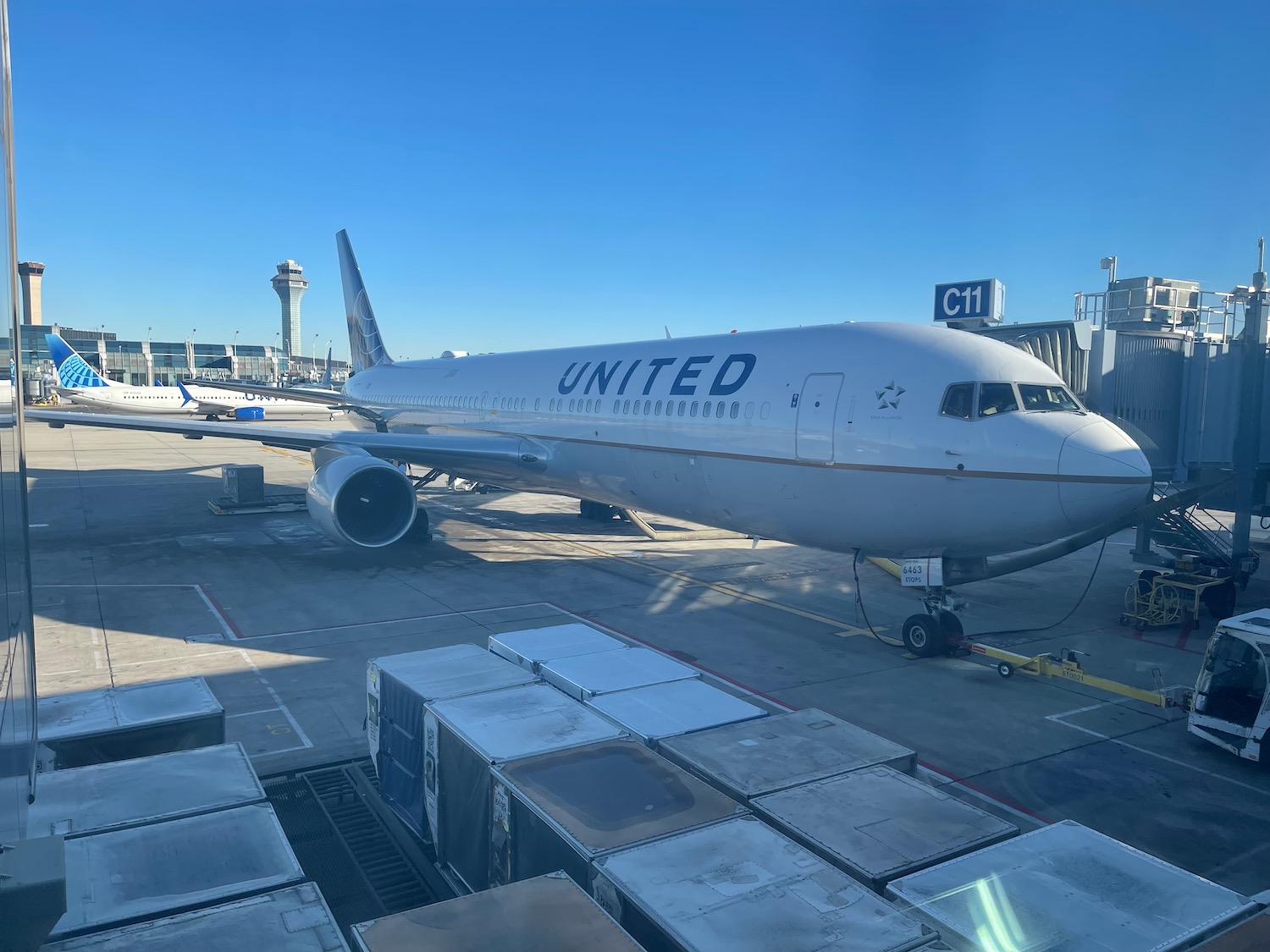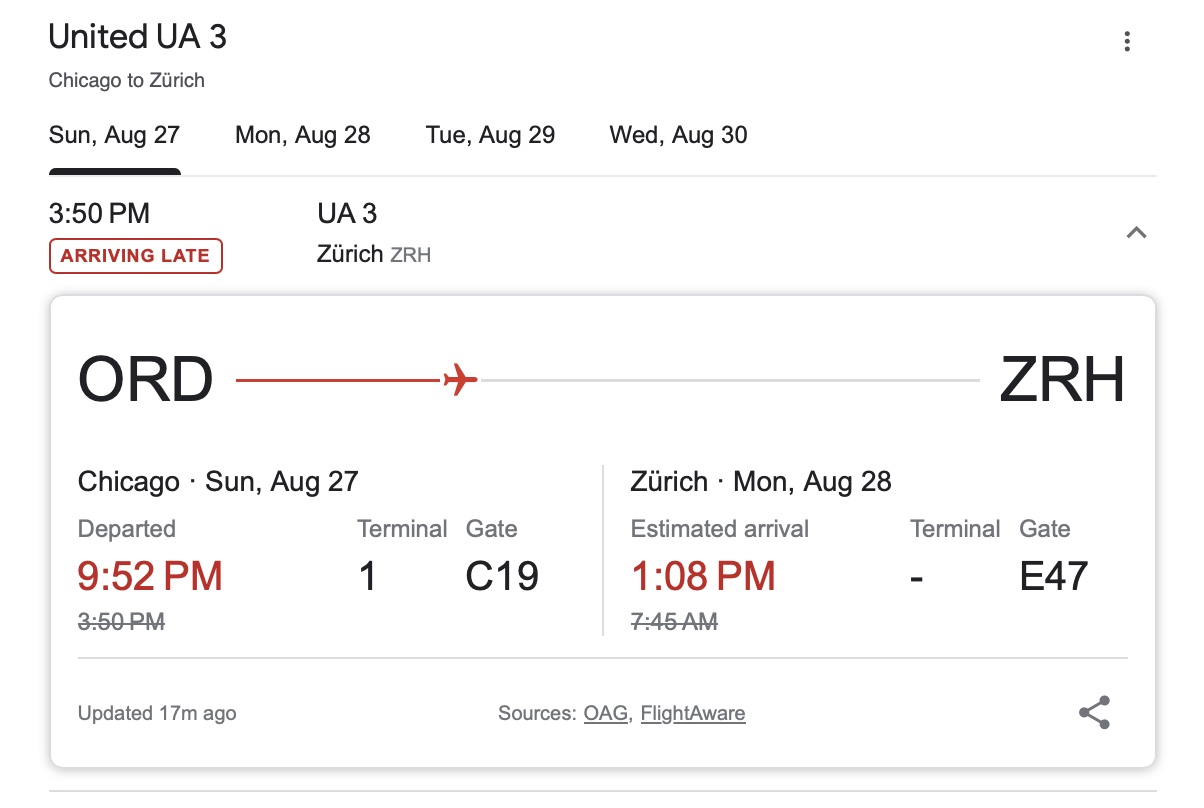
A United Airlines 767-300 bound for Zurich caused a temporary ground stop in Chicago O’Hare Sunday afternoon after encountering a mechanical issue just before takeoff.
UA3, A 767-300 From Chicago – Zurich Causes Ground Stop At O’Hare Airport
UA3, operated by a Boeing 767-300 (registration number N672UA), pushed back from the gate, taxied to the runway, but was forced to abort rotation when smoke poured out of an engine as it spooled for takeoff.
As a result, the aircraft became “stuck” on the active runway, forcing a number of runway diversions and the eventual closure of the airspace by the Federal Aviation Administration (FAA). The ground stop lasted for about 20 minutes and was lifted after the disabled 767 was towed back to the terminal.
United provided the following statement concerning the incident:
“United flight 3 experienced a mechanical issue shortly before takeoff. The aircraft was returned to the terminal where passengers safely deplaned. We are working to get our customers to their final destination as soon as possible.”
The aircraft was served and the flight took off at 9:52 pm CDT, just over six hours late, using the same aircraft:

It is not clear what may have caused this mechanical issue, but the aircraft was cleared for reentry to service and experienced no issue taking off for Zurich a second time.
CONCLUSION
After a United 767-300 essentially became stuck on the active runway after a mechanical-related problem, the FAA was forced to briefly order a ground stop until the aircraft could be cleared. That flight ended up departing six hours late using the same aircraft.
For those without schedule restraints, the later departure probably made sleeping much easier. I took UA3 earlier this year and generally find it quite difficult to fall asleep so early in the afternoon.
> Read More:United Airlines 767-300 Polaris Business Class Chicago – Zurich Review




I know that airplanes are machines and have millions of small parts that can go wrong but sometimes I wonder if some of these mechanical issues could be handled in a better way. Just the other day I was scheduled to take an early flight, plane had been there at the gate since the early evening on the day before, they boarded the entire plane to then find out a small mechanical problem. It took an hour for the mechanics to fix it and get all the paperwork ready. Thus, I wonder if they could had checked the plane after it arrived the night before to ensure it was ready for next morning. I know s..t happens but it sucks when they only find out after everyone is sitting inside.
The EU261 compensation is going to be quite steep.
Just a technicality:
There is no EU261 compensation because this flight is operated by a U.S. carrier TO the E.U. If it was an E.U. carrier operating the flight from the U.S. to the E.U. or this flight was DEPARTING FROM the E.U. then EU261 would be applicable.
Correct.
Although I’m certain it was perfectly safe, I’d be reluctant to fly overseas on an aircraft with a recent, as in 6 hours previous, engine issue. Maybe they could fly it domestic on a few routes so they have plenty of airports to divert to if there’s another issue.
My wife was on a flight coming into Chicago from Moline around the time this occurred . What her pilot did next was fly back to Moline. Causing her to have to fly back to Chicago and miss several other flights. That were part of trip. She was one of many flyers that had their day screwed up.
My experience on United has been that late-discovered mechanicals happen with troubling frequency, to the point that I wonder about the airline’s safety in a way that I never used to think about. But my personal data-set is obviously tiny, so I wonder whether others have the same experience on other airlines.
I think United is just more safety conscious than a lot of other airlines from what I’ve seen in the industry. There is a strong safety culture there. At some airline’s there is a look the other way and get the job done attitude.
Addressing some of the comments on here. “Should be away to find out sooner”. In this particular instance the problem arose only after the Aircraft had throttled up for departure. In comparison your vehicle has a significant alignment problem but only shows its true nature above 60 mph. Why didn’t you find it sooner.
Delayed trips/missed connections: Theres no doubt travel delays can be extremely frustrating. I would hope though that if you had to chose, you’d rather arrive safley then take unnecessary risk for punctual purposes. In this instance, a Heavy Boeing 767, full of fuel for a Transatlantic flight, suddenly has smome pouring out of the engine. Where the combustion happens. Which is mounted on a wing that, as stated above, is fully fuled.
Can you imagine the risk to other aircraft in critical phases of flight if God forbid there is an explosion?
The aircraft that had the engine issue was 658UA. 672UA was the replacement aircraft.
Are you sure about that? Not according to FlightRadar24.
Yes im sure.
The AVherald has the correct information as well. http://avherald.com/h?article=50da28b4&opt=0
A United Boeing 767-300, registration N658UA performing flight UA-3 from Chicago O’Hare,IL (USA) to Zurich (Switzerland), was accelerating for takeoff from Chicago’s runway 09C when the crew rejected takeoff at low speed due to a right hand engine (PW4060) fire.